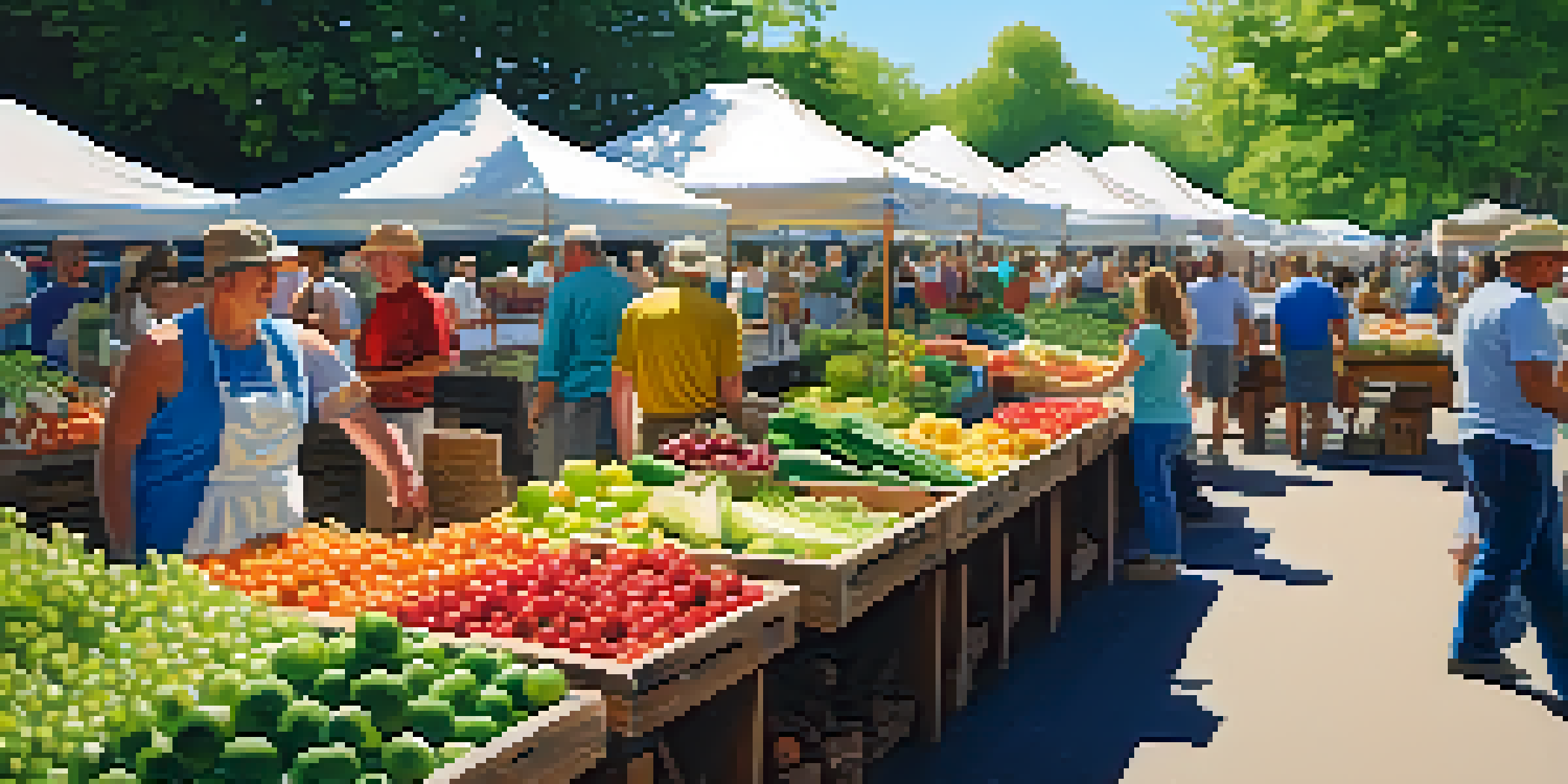Farm-to-Table Movement in Minneapolis: A Culinary Revolution

Understanding the Farm-to-Table Concept
The farm-to-table movement is all about creating a direct link between food producers and consumers. It emphasizes fresh, locally-sourced ingredients, which not only taste better but also support the community. By purchasing directly from farmers, restaurants and consumers can ensure that their food is both seasonal and sustainable.
Eating is an agricultural act.
In Minneapolis, this movement has gained momentum as chefs and diners alike seek to reconnect with the origins of their food. This shift toward local sourcing encourages a deeper appreciation for the agricultural landscape surrounding the city. It’s a culinary revolution that celebrates both quality and transparency in the food industry.
Moreover, the farm-to-table philosophy promotes environmental sustainability by reducing the carbon footprint associated with transporting food over long distances. As a result, the movement is not just about food; it’s about fostering a healthier ecosystem and community.
Minneapolis: A Hub for Local Farmers
Minneapolis is uniquely positioned to embrace the farm-to-table movement due to its proximity to a wealth of local farms. The surrounding area is rich in agricultural diversity, providing everything from fresh vegetables to artisanal cheeses. This abundance allows restaurants to craft menus that change with the seasons, highlighting the freshest ingredients available.

Local farmers' markets are thriving in Minneapolis, where residents can connect directly with the people who grow their food. These markets not only provide access to fresh produce but also foster community connections and support for local economies. It’s a vibrant scene that showcases the talents and offerings of local growers.
Farm-to-Table Boosts Local Economy
By supporting local farmers, the farm-to-table movement strengthens the local economy and promotes sustainable growth.
In addition, many Minneapolis restaurants have established partnerships with these farmers, creating a collaborative environment that benefits everyone involved. This synergy ensures that diners receive the freshest possible ingredients while local farmers gain a reliable market for their products.
The Role of Chefs in the Movement
Chefs play a crucial role in the farm-to-table movement by crafting dishes that highlight local ingredients. They often visit farms to select their produce, ensuring that they know exactly where their food comes from. This hands-on approach not only enhances the quality of their dishes but also allows chefs to tell the story of their ingredients to diners.
The future of food is in our hands and on our plates.
In Minneapolis, many chefs are passionate advocates for local sourcing, often featuring stories of their farmers on their menus. This transparency creates a stronger connection between diners and their meals, encouraging a greater appreciation for the effort that goes into food production. Guests are not just eating; they’re experiencing the journey from farm to plate.
Furthermore, these chefs often experiment with traditional recipes, infusing them with fresh, local flavors. This innovation keeps the culinary scene in Minneapolis dynamic and exciting, drawing in food enthusiasts eager to explore new tastes and textures.
Sustainability and Ethical Eating
Sustainability is at the heart of the farm-to-table movement, and Minneapolis restaurants are leading the charge. By sourcing ingredients locally, they reduce waste and promote environmentally friendly practices. Many establishments are also committed to using organic and ethically raised products, ensuring that their dishes are not only delicious but responsible.
This focus on sustainability extends to the way restaurants operate as well. Initiatives like composting, recycling, and minimizing food waste are becoming standard practices in many local eateries. These efforts resonate with consumers who are increasingly concerned about the environmental impact of their food choices.
Chefs Elevate Local Ingredients
Minneapolis chefs play a vital role in the movement by showcasing local ingredients and telling their stories to diners.
As a result, dining out in Minneapolis is becoming more than just a meal; it’s a conscious decision to support sustainable and ethical food practices. Diners can feel good about their choices, knowing they are contributing to a healthier planet.
The Impact on Local Economy
The farm-to-table movement has a profound impact on the local economy in Minneapolis. By supporting local farmers and producers, restaurants help keep money within the community, fostering economic growth. This creates a vibrant food ecosystem that benefits everyone, from the growers to the diners.
Moreover, as more people embrace this movement, it encourages further investment in local agriculture. Increased demand for local products can lead to the expansion of farms and the introduction of new agricultural techniques. This not only boosts the economy but also ensures a sustainable food supply for the future.
Additionally, local events and festivals celebrating farm-to-table cuisine draw visitors from outside the city, promoting tourism and further stimulating the economy. It’s a win-win situation that reinforces the importance of local food systems.
Community Engagement and Education
Community engagement is a vital aspect of the farm-to-table movement in Minneapolis. Many restaurants host events, workshops, and farm tours to educate the public about local food systems and sustainable practices. These initiatives foster a sense of community and encourage people to learn more about where their food comes from.
Schools and organizations are also getting involved, incorporating farm-to-table principles into their programs. Educational initiatives teach children about nutrition, gardening, and the benefits of eating locally. By instilling these values early on, Minneapolis is nurturing a generation of informed consumers who appreciate the importance of local food.
Sustainability Drives Dining Choices
The focus on sustainability in Minneapolis restaurants encourages diners to make responsible food choices that benefit the environment.
This community-focused approach not only enhances awareness but also builds lasting relationships between farmers, chefs, and diners. When people understand the story behind their food, they are more likely to support local businesses and advocate for sustainable practices.
The Future of the Farm-to-Table Movement
As the farm-to-table movement continues to gain traction in Minneapolis, its future looks bright. More restaurants are committing to local sourcing, and consumers are increasingly demanding transparency in their food choices. This trend is likely to inspire further innovations in culinary practices and community engagement.
Technology is also playing a role in shaping the future of this movement. Online platforms connecting farmers and consumers are emerging, making it easier than ever to access fresh, local ingredients. This accessibility can help expand the reach of the farm-to-table philosophy beyond the city limits.

Ultimately, the farm-to-table movement in Minneapolis is not just a trend; it’s a shift towards a more sustainable and community-driven food system. As more people join this culinary revolution, the positive impacts will resonate far and wide, transforming the way we think about and enjoy our food.